It is not nearly always that employees put their heart and soul into everything that they do. There are instances wherein they slack off and fail to do their…
continue reading20+ Sample Tenant Rejection Letters
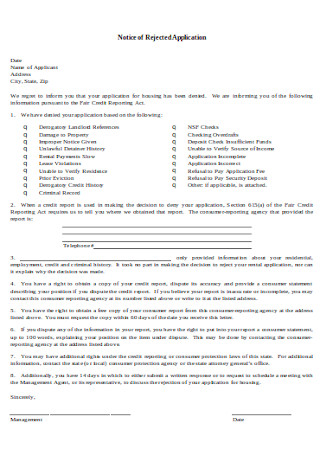
Rental Application Denial Letter
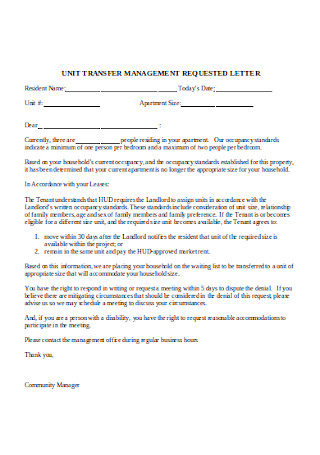
Notice of denied Unit by Tenant
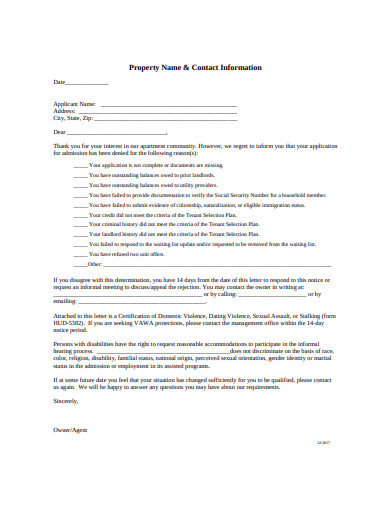
Application Rejection Letter
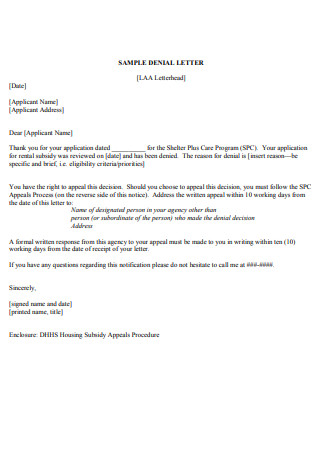
Sample Daniel Letter
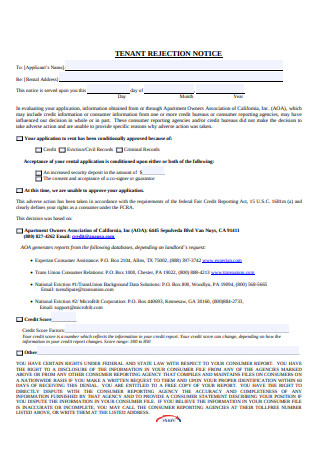
Tenant Rejection Notice
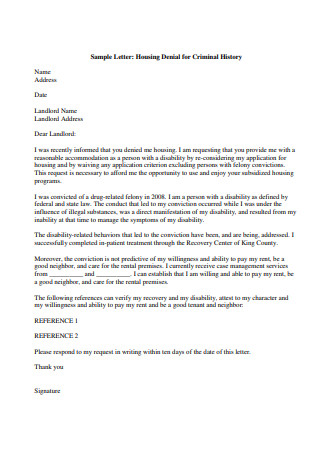
Sample Letter of Housing Denial
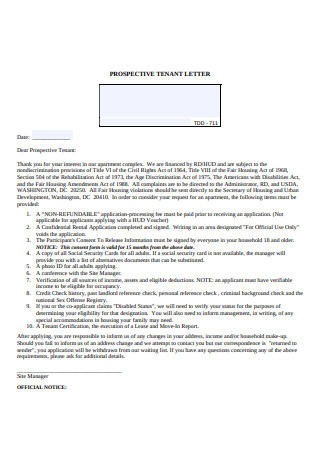
Prospective Tenant Letter
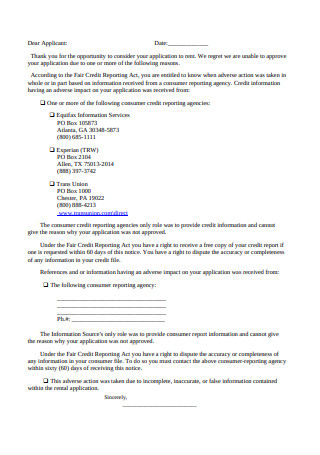
Adverse Action Letter
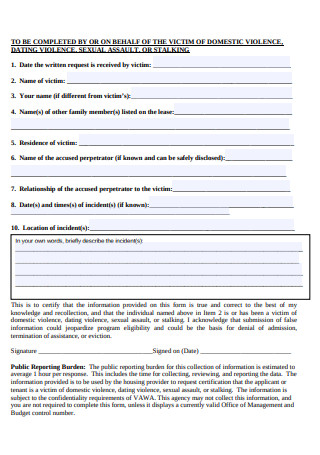
Tenant Reject Letter for Violation of Policy
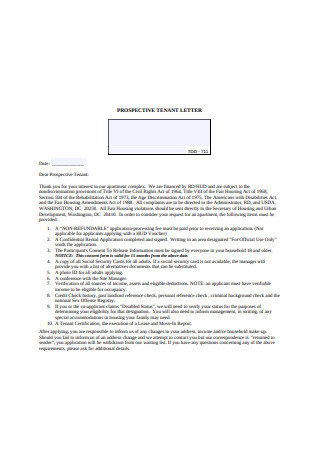
Prospective Tenant Rejection Letter
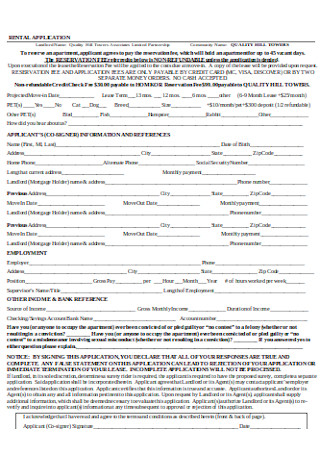
Rejection of Application Letter
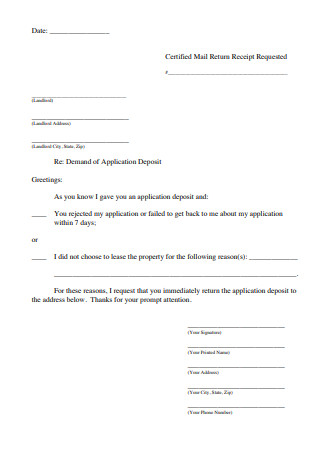
Demand Letter of Application Deposit
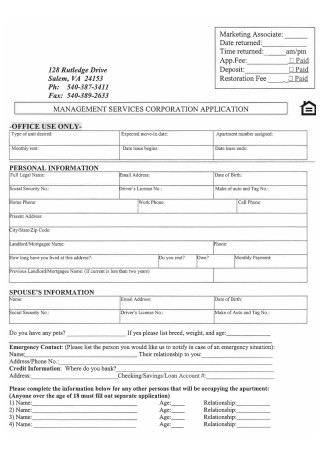
Rental Application Rejection Format
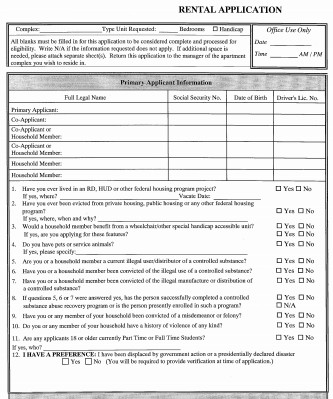
Tenant Decline Letter Sample

Sample Decline Offer Letter
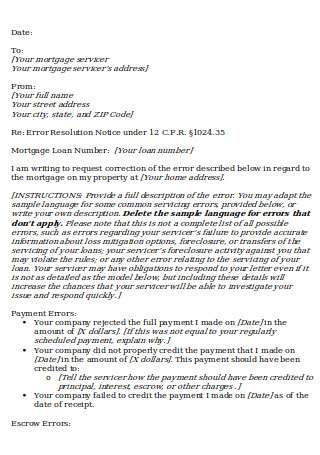
Payer Rejection Letter
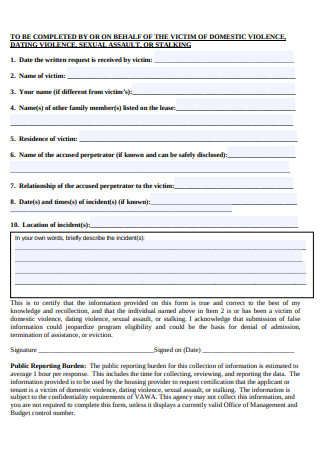
Notice of DenialWithdrawal of Application
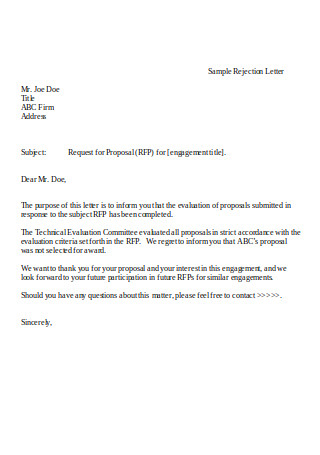
Sample Rejection Letter
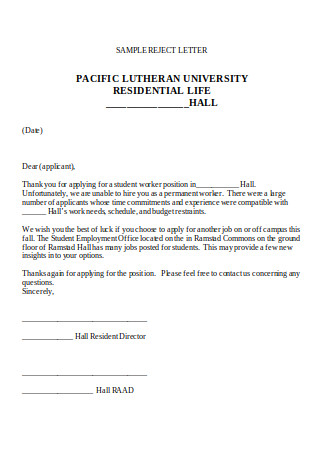
Resident Rejection Letter
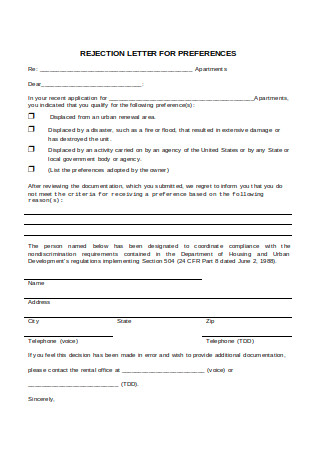
Rejection Letter for Preference
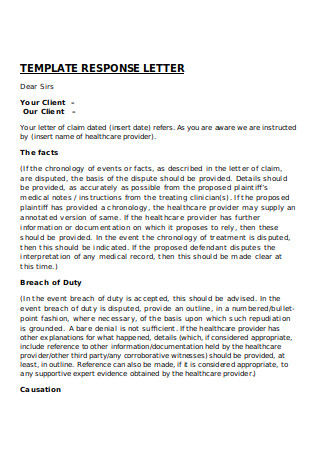
Tenant Response Letter
What Is a Tenant Rejection Letter?
It is the landlord’s prime responsibility to send applicants with a tenant rejection letter that states the denial of their application. A tenant rejection letter is a type of document that informs a prospective tenant regarding the valid and legitimate reasons for rejecting his or her application. Sending a tenant rejection letter is often the last step of most tenant screening processes and sending one complies with the law.
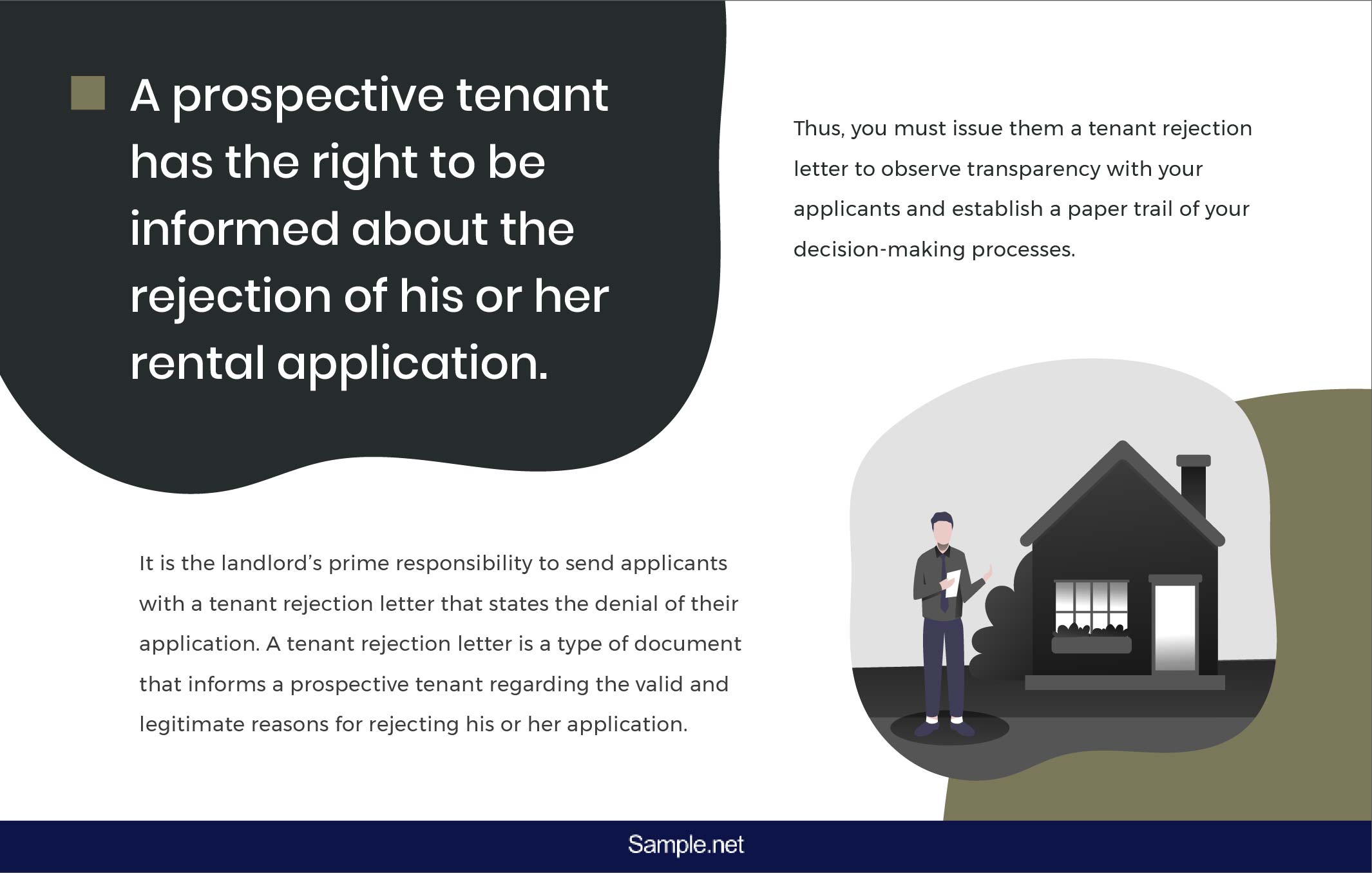
Types of a Tenant Rejection Letter
If there is a need for you to deny a prospective tenant’s rental application, make sure that you will do it the right way. With that, learn the various types of a tenant rejection letter and know what type you should send to an applicant.
How to Write a Tenant Rejection Letter
There are a lot of landlords who find it difficult to write a letter that informs an interested rental applicant regarding his rejection. But if you have a legal and effective system for denying and approving a rental applicant, it will not only be possible for you to compose a rejection letter easily, but it will also be helpful for you to avoid legal entanglements and any miscommunication among the applicants. With that, you must know how to compose an effective tenant rejection letter. The guidelines are as follows:
Step 1: Thank the Applicant
Before you break the news to the prospective tenant of the rejection of his or her application, you must express your gratitude first. Even if you are ultimately going to reject the tenant, they deserve to receive a rejection letter that has a polite and respectful tone. You can mention that you are grateful for the applicant for taking interest and for choosing your property over any other rental properties out there.
Step 2: Cite the Reasons
As soon as you briefly express your gratitude toward the applicant, waste no more time, and inform the prospective tenant that he or she has not met your requirements to become a tenant. State the reasons right after briefly and firmly. Make sure that these reasons are valid and legitimate, specifically under the Fair Housing laws.
Step 3: Attach the Supporting Documents
If the situation calls for it, prepare all the necessary documents that serve as proof and attach it along with the rejection letter. If you encounter an angry applicant, the supporting documents will help you in explaining to the person your solid basis for the rejection. Among the documents that you can use as proof are the third-party investigation documents that you acquire during your tenant screening and background check.
Step 4: Observe Brevity and Conciseness
A tenant rejection letter is a type of formal letter, and just like any other formal letters, your rejection letter should not contain long and winding sentences. Two of the things you could do to observe brevity and conciseness is to limit the number of paragraphs up to three and each should contain three sentences at the most. However, if you find the need to discuss the reasons for rejection further, then do so but make sure you keep the rest of the contents brief, concise, and direct to the point.
Step 5: Provide the Applicant with Alternatives
If you’re rejecting an applicant simply because you have already found a tenant and that he or she applied too late, you may provide the applicant with alternative rental options that he might want to consider. Looking for potential vacant rental properties to rent to is already as difficult as getting accepted into one.
Step 6: Affix Your Signature
Verify the validity of your tenant rejection letter by affixing your name and signature. Your signature is not just a small part of your letter that you can opt to miss if you want to. Without the signature, your decision to reject an application will not be taken officially and seriously by its recipient.
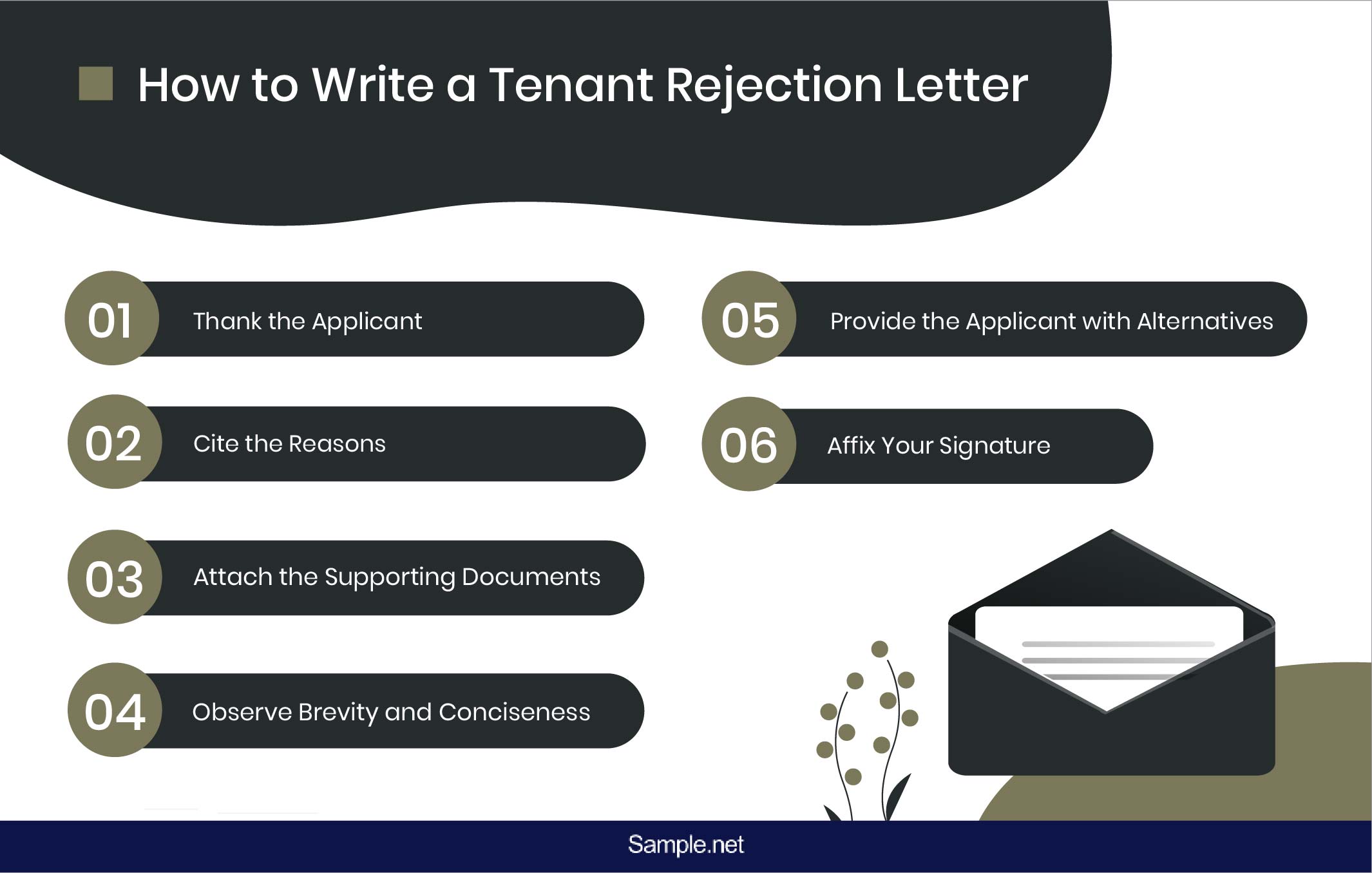
Legal Reasons for Tenant Rejection
As mentioned, it is not illegal to decline a prospective tenant; however, you cannot just reject a prospective tenant by simply basing it on your poor judgment of people. A lot of landlords would tend to forget to base the denial of a tenant application on the Fair Housing laws that state the legal consequences of denying a tenant’s rental application. If you are one of the population who usually forgets or has no idea about this, then read on below as we have listed the most popular and legal reasons for denying a tenant application.
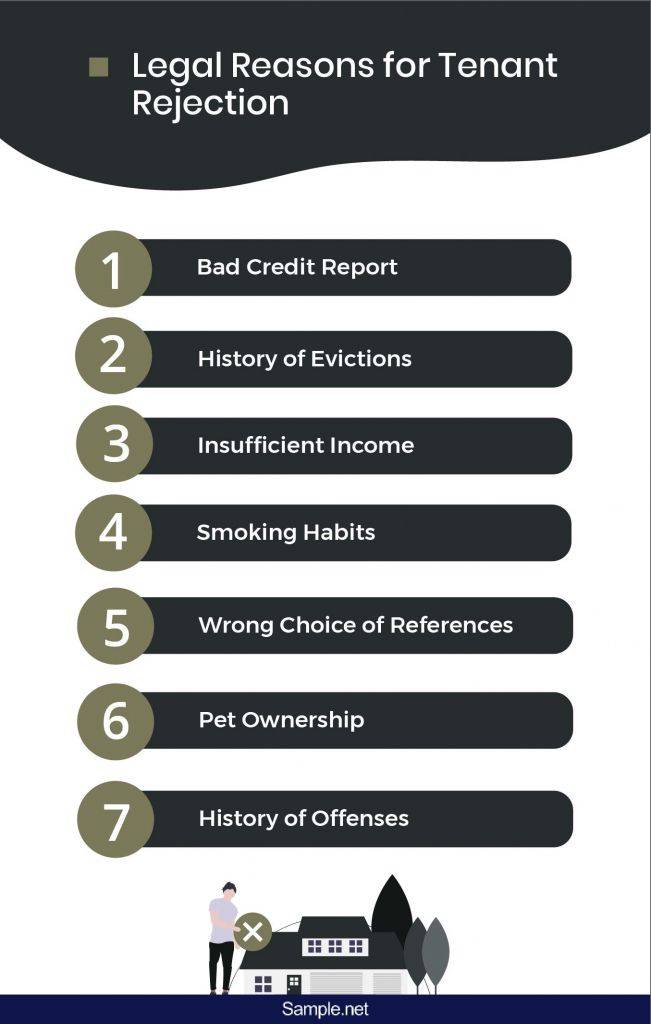
The Dos and Don’ts of a Tenant Rejection Letter
Writing a rejection letter for a prospective tenant is never easy and is never going to be. However, you can make use of this letter as a way for you to build goodwill with the applicants and leave them with a good lasting impression. Luckily for you, we have provided some guidelines that you can follow to make tenant rejection letter writing a manageable task.
Dos
1. Do follow a business letter standard format.
A tenant rejection letter is a type of a business letter which is why, when writing one, you need to follow the standard format of a business letter. You need to secure its essential parts which include the return address and the inside address, the date when the letter was written, the salutation, the body of the letter, the complimentary close, and the signature line.
2. Do stick to your tenant screening criteria and standards.
If you have set guidelines for your ideal tenant, then make sure you stick to it and not bend just because of the applicant’s feelings. If you don’t want someone who smokes, then let the applicant know and if you don’t want someone who has pets, then be honest to the applicants and give them factual feedback. By doing so, you ensure the uniformity of your actions as a landlord, and you also protect yourself from any allegations that you treat some applicants better compared to others.
3. Do send the rejection letter.
Sending a rejection letter will benefit and mean more a lot to the applicants than you think. If you have ever tried applying for rental properties before, you would know how frustrating it is to apply without hearing any further feedback. Send a tenant rejection letter as soon as you have decided not to accept them. Not sending one is not only inconsiderate and rude, but it is also unprofessional.
4. Do heed to the Federal Fair Housing Act.
The Federal Fair Housing Act has its fair share of pros and cons on the landlord’s end. This act protects the enforcement of justifiable policies and gives landlords opportunities to prove their cases. According to CNBC, civil court lawsuits, judgments or liens account for 20 percent of rejected applications. However, it is also essential to know that any minor inconsistency in the enforcement of this act can severely affect a case and some rulings are unpredictable even if the landlord’s case is strong. Even if it is not 100% favorable for you, you still need to comply, or else it would result in a lawsuit by an applicant who thinks his or her rejection was unjust.
Don’ts
1. Don’t give any false hopes.
Be upfront about the reason why you deny a prospective tenant’s application without being horrible and without giving any false hopes. However, if you intend to keep their application on file, be sure to let the applicant know if ever you have vacancies or availabilities in the future. But if you know that you wouldn’t be keeping their application around, then make sure to inform them if you won’t.
2. Don’t have invalid reasons for rejection.
Any reason based on discrimination, such as race, religion, color, national origin, sexual orientation, and arbitrary discrimination, is invalid. Rejecting an applicant based on their protected class is against the Fair Housing Laws. Fines and charges will be filed against you if you are found guilty of violating the federal Fair Housing Act.
3. Don’t mention the difficulty of the decision-making process.
Do not even think about harping how you’ve had difficulty in choosing the right applicant—stating would be insensitive to their feelings especially if you are informing them of their rejection from a rental property they were hoping to get. Just cut to the chase because they won’t mind how tough the decision-making process was.
4. Don’t make a poorly written content.
Before you get your letter ready for printing, make sure you have thoroughly proofread and edited it. A poorly written letter is nothing but unprofessional. Be sure to correct any grammatical mistakes and spelling errors. You can either take a break from your final draft for a while so you can get back to it with a different perspective or you can ask someone to check it for you.
Rejecting a prospective tenant can be quite difficult and uncomfortable for the most part; however, it is your responsibility to give them valid and legal reasons for their rejection. You must send out a rejection letter as soon as you decide to reject applicants. It will not only make it easier for you to cite the reasons for rejecting them, but it also keeps you from getting sanctioned. Make sure to download and use any of the tenant rejection letter templates provided above to get started with your tenant rejection letter writing.


